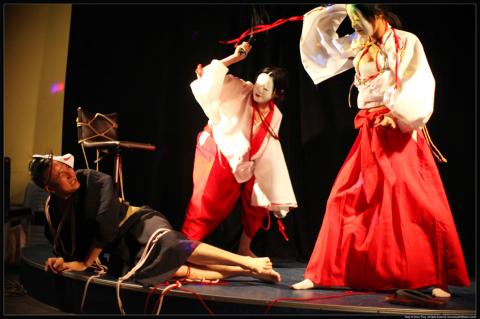When BDSM Company (皮繩愉虐邦) staged its first public bondage/domination and sadomasochism (BDSM) show in June, two Next Magazine (壹週刊) journalists wrote a report on it using sensational language and unauthorized photographs, questioning whether the performance was “a crime against public decency” (妨害風化).
As part of the Taipei Fringe Festival (台北藝穗節), the same troupe will debut a new theatrical performance titled You Can Be the Kinky Star! (你就是SM片最佳男女主角!) about a group of BDSM enthusiasts auditioning for a BDSM movie. After the NT$500 show, audience members can pay an additional NT$500 to gain hands-on experience with the troupe. Experts will assist participants in arranging and engaging in BDSM performances, and a professional photographer will be on-hand to record it all. The activity is limited to those who have seen the performance.
Members of the company stress that while their performances are theatrical, they are not only about entertainment.

Photo courtesy of BDSM
“We share similarities with theater people in the sense that we are more aware of the limitations our society and culture impose on our bodies,” said Song Jia-lun (宋佳倫), one of the group’s founders. “Theater is a medium, making BDSM more accessible to the general public ... Perhaps through performances, audiences will be more conscious of what limits and represses their bodies and try to break free. We would be happy if audiences stopped seeing [BDSM practitioners] as perverts and pick up an easy trick or two, like tying hands or blindfolding, and tried them at home.”
Founded in 2004 by a group of like-minded people who met on Huakuei Sex (花魁藝色館), a bulletin board which supports the rights of sexual minorities and hosts related discussions, BDSM Company was launched as an activist group for Taiwan’s BDSM community. The group is an active participant in the annual Taiwan Pride Parade. Members have given lectures and held discussions at colleges across the country, building a Chinese-language archive of BDSM-related educational materials on the company’s Web site (www.bdsm.com.tw). Some members, including Song, take a more political approach and work at the Green Party Taiwan (綠黨), which supports sexual diversity.
However, the group’s liberal stand on gender roles in erotic practices sometimes conflicts with BDSM enthusiasts who hold more conservative views, Song says.
“What we do now is focus on changing the negative views outsiders hold on BDSM rather than serving insiders ... Our imagination and understanding of BDSM can be vastly different from many other practitioners,’” she said.
The group holds a talk every month with the aim of raising awareness of BDSM. Anyone is welcome to share their ideas or simply chat and meet people.
“There is no topic or theme,” said Song, who is better known as Shihyeh Queen (十夜女王) in BDSM circles. “What happens, happens. Maybe people will show up with ropes and start giving a bondage lesson. Who knows?”
The monthly gathering takes place every second Saturday of the month at G Straight Cafe (直走咖啡) at 18, Ln 27, Dingzhou Rd, Sec 3, Taipei City (台北市汀州路三段27巷18號). Visit the group’s Web site for updates.
BDSM Company’s productions on Sunday at Nanhai Gallery (南海藝廊) and on Sept. 9 and Sept. 10 at the Comedy Club sold out two weeks ago. If you don’t have tickets, but still want to learn about BDSM, bondage artist Shima Malphas from Japan will perform late tonight and tomorrow (“definitely after 11:30pm,” organizers say) at Show House (秀屋) at 161 Daguan Rd, Greater Taichung (台中市大觀路161號). For more information, call (04) 2251-5888 or visit www.show-house.com.tw.

Three big changes have transformed the landscape of Taiwan’s local patronage factions: Increasing Democratic Progressive Party (DPP) involvement, rising new factions and the Chinese Nationalist Party’s (KMT) significantly weakened control. GREEN FACTIONS It is said that “south of the Zhuoshui River (濁水溪), there is no blue-green divide,” meaning that from Yunlin County south there is no difference between KMT and DPP politicians. This is not always true, but there is more than a grain of truth to it. Traditionally, DPP factions are viewed as national entities, with their primary function to secure plum positions in the party and government. This is not unusual

More than 75 years after the publication of Nineteen Eighty-Four, the Orwellian phrase “Big Brother is watching you” has become so familiar to most of the Taiwanese public that even those who haven’t read the novel recognize it. That phrase has now been given a new look by amateur translator Tsiu Ing-sing (周盈成), who recently completed the first full Taiwanese translation of George Orwell’s dystopian classic. Tsiu — who completed the nearly 160,000-word project in his spare time over four years — said his goal was to “prove it possible” that foreign literature could be rendered in Taiwanese. The translation is part of

Mongolian influencer Anudari Daarya looks effortlessly glamorous and carefree in her social media posts — but the classically trained pianist’s road to acceptance as a transgender artist has been anything but easy. She is one of a growing number of Mongolian LGBTQ youth challenging stereotypes and fighting for acceptance through media representation in the socially conservative country. LGBTQ Mongolians often hide their identities from their employers and colleagues for fear of discrimination, with a survey by the non-profit LGBT Centre Mongolia showing that only 20 percent of people felt comfortable coming out at work. Daarya, 25, said she has faced discrimination since she

The other day, a friend decided to playfully name our individual roles within the group: planner, emotional support, and so on. I was the fault-finder — or, as she put it, “the grumpy teenager” — who points out problems, but doesn’t suggest alternatives. She was only kidding around, but she struck at an insecurity I have: that I’m unacceptably, intolerably negative. My first instinct is to stress-test ideas for potential flaws. This critical tendency serves me well professionally, and feels true to who I am. If I don’t enjoy a film, for example, I don’t swallow my opinion. But I sometimes worry